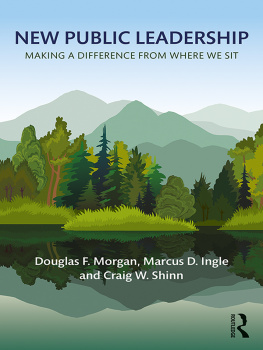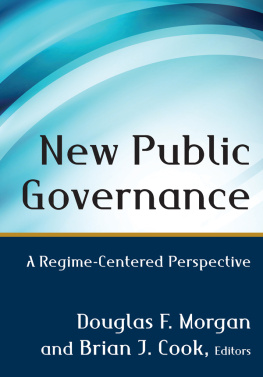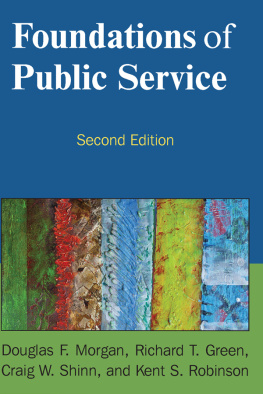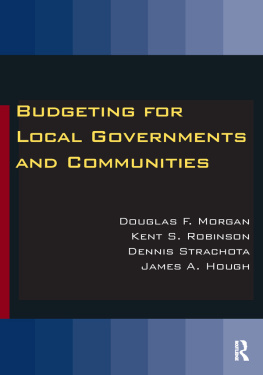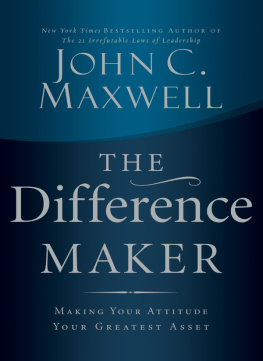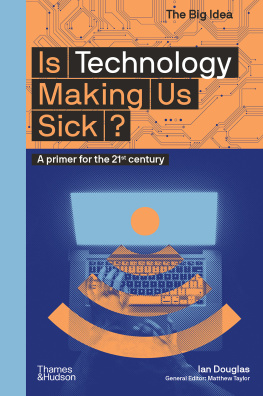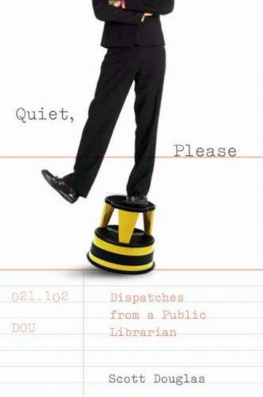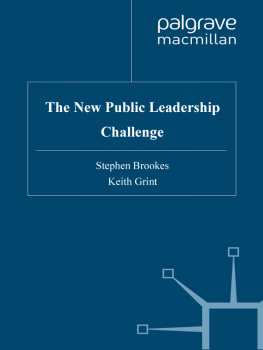New Public Leadership
Most leadership literature stems from and focuses on the private sector, emphasizing personal qualities that bind leaders and followers to a shared purpose. As the authors of New Public Leadership argue, if these shared purposes do not build trust and legitimacy in public institutions, such traditional leadership tropes fall short of the standard demanded by contemporary public servants. For 20 years the authors have been developing a leadership education and training framework specifically designed to encourage public service professionals to lead from where they sit. This book presents that comprehensive, integrated and practical leadership framework, grounded in the uniqueness of public legal missions, culture, history and values.
The authors explore three key elements of leadership success: 1) an understanding of our public service context, including the history, the values and the institutions that comprise our leadership setting, 2) a set of tools designed to help leaders initiate collective action in wicked challenge settings and 3) tools to support sound judgment, enabling leaders to do the right thing in the right circumstances for the right reasons. The authors further provide readers with a basic understanding of democratic institutions, encouraging them to work within and across multiple vertical and horizontal systems of authority. The book is organized into four parts, each of which is accompanied by a Master Case that provides the reader with an opportunity to apply the principles and leadership tools discussed in the text to practice. To further reinforce the practice-centered approach to leadership knowledge and skills, the authors have developed the accompanying EMERGE Public Leadership Performance Platform, complete with exercises, available online. Written specifically with the practicing public manager in mind, this book arms public servants with a large repertoire of leadership skills, designed to accommodate changing public values and conflicting priorities at all levels of our public organizations.
Douglas F. Morgan is Professor Emeritus of Public Administration in the Hatfield School of Government at Portland State University, USA.
Marcus D. Ingle is Professor of Public Administration and Director of the EMPA Program and Global Studies Concentration in the Hatfield School of Governments Department of Public Administration at Portland State University, USA.
Craig W. Shinn is Professor Emeritus of Public Administration in the Hatfield School of Government at Portland State University, USA.
This book is a must read. It confronts readers with the complex reality that effective, ethical leading for the public good is an honor and privilege but also an unprecedented challenge The authors provide practical advice about improving public leadership using an artful blend of theory and their own decades of experience working hand-in-hand with public leaders.
J. Steven Ott, University of Utah, USA
The deep respect the authors show for the critical and deeply honorable action of public leadership, and the grounding they provide in the historical, political, and moral context, ensures that the book will have an enduring impact on students, scholars, and practitioners who will, each in their own way, become the leaders their fellow citizens need.
Brian J. Cook, Virginia Tech, USA
First published 2019
by Routledge
711 Third Avenue, New York, NY 10017
and by Routledge
2 Park Square, Milton Park, Abingdon, Oxon, OX14 4RN
Routledge is an imprint of the Taylor & Francis Group, an informa business
The right of Douglas F. Morgan, Marcus D. Ingle and Craig W. Shinn to be identified as authors of this work has been asserted by them in accordance with sections 77 and 78 of the Copyright, Designs and Patents Act 1988.
All rights reserved. No part of this book may be reprinted or reproduced or utilised in any form or by any electronic, mechanical, or other means, now known or hereafter invented, including photocopying and recording, or in any information storage or retrieval system, without permission in writing from the publishers.
Trademark notice: Product or corporate names may be trademarks or registered trademarks, and are used only for identification and explanation without intent to infringe.
Library of Congress Cataloging-in-Publication Data
Names: Morgan, Douglas F., 1943 author. | Ingle, Marcus, author. | Shinn, Craig W., author.
Title: New public leadership : making a difference from where we sit / Douglas F. Morgan, Marcus D. Ingle, and Craig W. Shinn.
Description: New York, NY : Routledge, 2018. | Includes bibliographical references and index.
Identifiers: LCCN 2018018201| ISBN 9780765634634 (hbk : alk. paper) | ISBN 9780765634641 (pbk : alk. paper) | ISBN 9780429450181 (ebk)
Subjects: LCSH: Public administrationUnited States. | LeadershipUnited States. | Decision makingUnited States. | Public administrationUnited StatesCase studies. | LeadershipUnited StatesCase studies. | Decision makingUnited StatesCase studies.
Classification: LCC JK468.L43 M67 2018 | DDC 352.23/60973dc23
LC record available at https://lccn.loc.gov/2018018201
ISBN: 978-0-765-63463-4 (hbk)
ISBN: 978-0-429-45018-1 (ebk)
ISBN: 978-0-765-63464-1 (pbk)
Our problem is not the lack of knowing; it is the lack of doing. Most people know far more than they think they do.
(Mark O. Hatfield)
We dedicate this book to those who have chosen a life of public service even though it has lost much of its fashion and high place of honor. We are particularly indebted to the thousands of experienced practitioners we have taught over the last many decades. Their prudence and practical understanding of what is needed to make democracy work in the thousands of local government and nonprofit organizations across the diverse American landscape is the single inspiration and guiding focus of this book. We have sought to capture what they have taught us and to render this accessible to their successors. We believe the well-being of our systems of democratic governance depends upon capturing the wisdom of our practitioners and passing it on to a public sector workforce that is undergoing a major succession turnover in leadership. We thank our students for all that we have learned, but hold only ourselves responsible for any failings or mistakes in this work.
Douglas F. Morgan is Professor Emeritus of Public Administration in the Hatfield School of Government at Portland State University. He has held a variety of administrative leadership positions at the University of Illinois, Springfield, Lewis and Clark College and at Portland State University where he served as Director of the Executive Leadership Institute, the Executive Master of Public Administration Program and Chair of the Public Administration Division. He has held a variety of public positions, both elected and appointed. His research interests focus on the role career public administrators play in ensuring effective and responsive systems of local democratic governance. He is co-author of New Public Governance with Brian Cook (M.E. Sharpe, 2014), of Foundations of Public Service, 2nd ed. (M.E. Sharpe, 2013) and Budgeting for Local Governments and Communities (M.E. Sharpe, 2014). His work has appeared in the Handbook of Administrative Ethics, Oregon Politics and Government, The International Encyclopedia of Public Policy and Administration, Public Administration Review, Administration & Society

